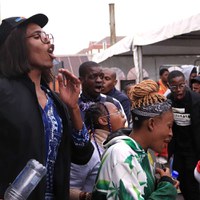
The Legacy of Apartheid Perpetuates Toxic Masculinity in South African Universities

As a feminist organisation, the Soul City Institute is concerned that 30 years into our democracy, there are still institutions of higher learning committed to oppression, grooming young men to continue the culture of violence against marginalised groups.
It is said that inside the rooms of a student residence, officials found walls covered in graffiti, Ku Klux Klan-style hoods and a foul concoction of linseed oil and crystals. They also seized photographs of apparent initiation ceremonies going back decades and a written account of ceremonies and crude sketches depicting sexual assault.
Despite alleged investigations, the practice appears to be ongoing and causing more harm on campus.
The exposé was followed by a report from a former Wilgenhof resident who detailed the punishment he endured in 2022, including being forced to drink a toxic mixture of linseed oil and aloe crystals, and having a liquid with a "urine-like odour" being poured over his body.
In this open letter to fellow Wilgenhoffers, Wilhelm Verwoerd details similar experiences and the work it took for him to unlearn this toxic culture.
“For example, I am ashamed to admit it is only in the last week, through the eyes of a young colleague, Rabia Abba Omar, that I have seen the obvious connection between our traditional Nagligte executioner-style clothing and the Ku Klux Klan,” he says.
Further warning that for those who benefit from racist patriarchal systems, breaking the cycle of violence requires cultivating a value-based, self-reflective, historically aware way of being.
It hasn't been long since the turmoil resulting from students protesting the predominant use of the Afrikaans language as the medium of instruction at the university. It appears that Stellenbosch University is not prioritising inclusion on its campuses.
A recent Netflix series “Miseducation” explores themes of financial exclusion, corruption and harmful initiation practices in South African Universities. Although fictitious, the characters depict the various intersecting realities of black students who seek to further their studies at “white” institutions.
Not only does this toxic culture create a barrier to education access, but it also perpetuates violence in the broader society. Members may survive the torture, but these aren’t victimless crimes. The survivors and leaders of such groups often go out into the workforce and find more juniors to harass and intimidate. With others the pain is felt by spouses and children at home. It’s a never-ending cycle and must stop.
University leaders should take it upon themselves to prioritise rooting out the toxic and exclusionary culture in residences and respond appropriately to residents and alumni actively resisting efforts to do so. A university is a place of education, not a grooming ground for racism and patriarchy.
Itumeleng Letsolao is the commmunuications officer at the Soul City Institute for Social Justice
